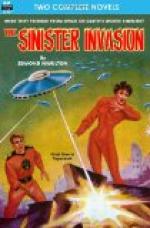It said blandly that a bolide—a slow-moving, large meteoric object—had been observed by radar to be descending to earth. It had been tracked throughout its descent. It had landed in Boulder Lake. Air photos taken since its landing showed that an enormous disturbance of the water of the lake had taken place. It had seemed wise to remove workmen from the neighborhood of the meteoric fall, and the whole occurrence had been made the occasion of a full-scale practice emergency response by air and other defense forces. Investigation of the possible bolide itself was under way.
The writer of the bulletin was obviously sitting on Vale’s report and that of the workmen so as to tell as little as possible and that slanted to prevent alarm. The bulletin went on to say that there was no justification for the alarming reports now spreading through the country. This happening was not—repeat, was not—in any way associated with the cold war of such long standing. It was simply a very large meteor arriving from space and very fortunately falling in a national park area, and even more fortunately into a deep crater lake so that there was no damage even to the forests of the park.
The bulletin had no effect, of course. It was too late. It was released at just about the time the temperature in the metal prison—which seemed likely to become a metal coffin—had begun to fall. The moving sun had gone behind a mountain and the compost pit shell was in shadow once more.
Again the cover of that giant box was opened. A porcupine was dropped inside. The cover went on again. This was, at a guess, about five o’clock in the afternoon. The chunky man said drearily, “If this is supposed to be the way they’ll feed us, they coulda picked something easier to eat than a porcupine!”
The box now held four men, three rabbits—panting in terror in one corner—half a dozen game birds and the just-arrived porcupine. All the wild creatures shrank away from the men. At any sudden movement the birds tended to fly hysterically about in the dimness, dashing themselves against the metal wall.
“I’d say,” observed Lockley, “that his guess,” he nodded at the tall man, “is the most likely one. Rabbits and birds and porcupines would be considered specimens of the local living creatures. We could be considered specimens too. Maybe we are. Maybe we’re simply being held caged until there’s time for a scientific examination of us. Let’s hope they don’t happen to drop a bear down here to wait with us!”
The tall man said, “Or rattlers! I wonder what time it is. I’ll feel better when dark comes. They’re not so likely to find rattlers in the dark.”
Lockley said nothing. But if Boulder Lake had been chosen for a landing place on the basis of previously acquired information, it wasn’t likely that either bears or rattlesnakes would be put in confinement with the men. The men would have been killed immediately, unless there was a practical use to be made of them. He began to make guesses. He could make a great many, but none of them added up exactly right.




